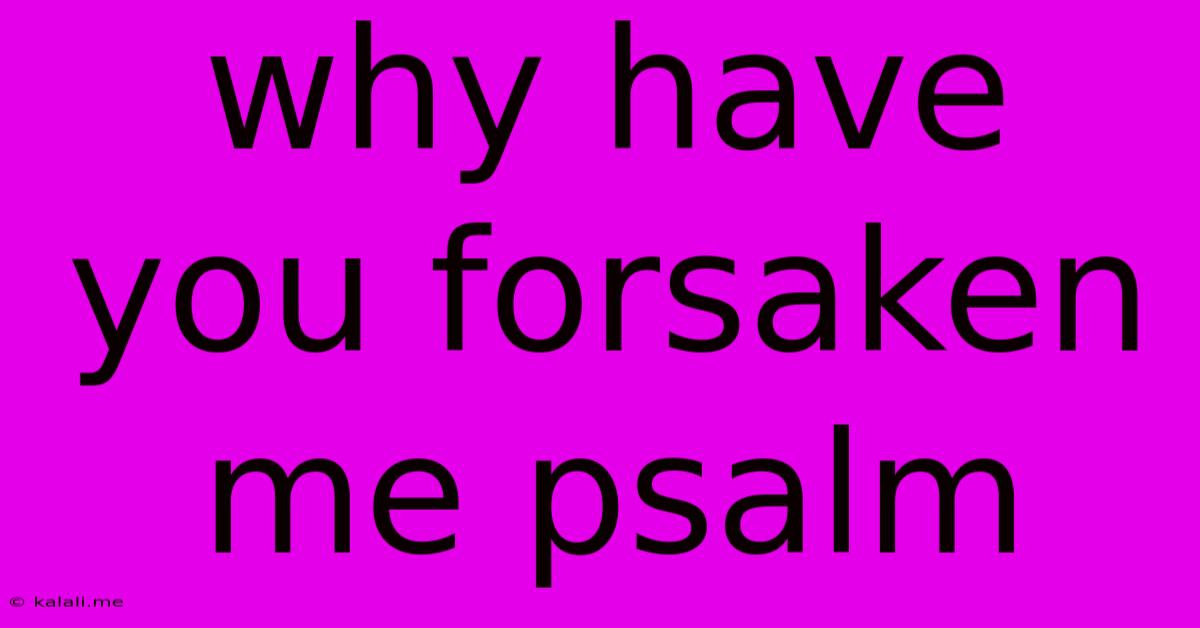Why Have You Forsaken Me Psalm
Kalali
Jun 07, 2025 · 3 min read

Table of Contents
Why Have You Forsaken Me? Psalm 22: A Cry of Abandonment and Hope
Psalm 22, a powerful and poignant lament, explores the depths of human suffering and the unwavering faith that can endure even in the face of seemingly insurmountable despair. The opening line, "My God, my God, why have you forsaken me?", has resonated with countless individuals throughout history, grappling with feelings of abandonment, betrayal, and the agonizing question of God's presence in the midst of pain. This article delves into the context, themes, and enduring relevance of Psalm 22, revealing its surprising message of hope amidst profound anguish.
The psalm's raw emotion immediately grabs the reader. It's not a polished hymn of praise, but a visceral cry from the depths of despair. The psalmist's intense suffering is vividly depicted, painting a picture of physical pain, isolation, and spiritual anguish. He feels abandoned by God, a feeling that intensifies the already overwhelming physical and emotional torment. This makes it incredibly relatable to anyone who has ever felt alone, misunderstood, or seemingly forsaken by a higher power or loved one.
The Context of Psalm 22
While the exact historical context remains debated, many scholars believe Psalm 22 reflects the experience of someone facing intense persecution and suffering, possibly even crucifixion. The imagery of being pierced, mocked, and ridiculed strongly parallels the suffering described in the Gospels concerning Jesus Christ. This has led to the psalm's profound significance in Christian theology, with Jesus himself quoting its opening words from the cross (Matthew 27:46). This connection, however, doesn't diminish the psalm's independent power and enduring relevance for anyone grappling with feelings of abandonment.
Exploring the Themes of Abandonment and Betrayal
The feeling of abandonment is central to Psalm 22. The psalmist's cries for help are met with apparent silence, deepening his sense of isolation and despair. He feels betrayed not only by his enemies but also, more profoundly, by God. This theme of perceived divine absence resonates deeply with those who suffer immensely, questioning why God allows such pain and suffering. The psalm acknowledges the legitimacy of this question, refusing to offer simple, easy answers.
Beyond Despair: The Seeds of Hope
Despite the overwhelming despair, Psalm 22 isn't solely a lament. Interspersed throughout the cries of anguish are expressions of faith and trust. The psalmist's memory of God's past faithfulness, however faint, flickers like a tiny flame in the darkness. He clings to the hope of deliverance, envisioning a future where he will praise God before those who mocked him. This subtle shift highlights the psalm's complexity; it acknowledges the reality of suffering without dismissing it, while simultaneously pointing towards the enduring power of faith and hope.
The Enduring Legacy of Psalm 22
The enduring legacy of Psalm 22 lies in its honesty and vulnerability. It doesn't shy away from the raw, painful realities of suffering but simultaneously offers a testament to the resilience of the human spirit and the unwavering power of faith. Its relevance extends beyond religious contexts, speaking to anyone who has felt abandoned, betrayed, or overwhelmed by pain. The psalm reminds us that it's okay to wrestle with difficult questions of faith and suffering, that our cries of anguish are heard, and that even in the darkest moments, hope can persist. It serves as a powerful reminder that even in the depths of despair, the possibility of redemption and restoration remains. It's a testament to the human capacity for resilience and the enduring power of faith amidst profound suffering.
Latest Posts
Latest Posts
-
Htaccess Allow Folders With No Index File
Jun 07, 2025
-
Can You Put Hairspray In Checked Luggage
Jun 07, 2025
-
How To Set Additional Properties In Sftp Client
Jun 07, 2025
-
Cement Board Vs Drywall For A Beginners Bathroom
Jun 07, 2025
-
How To Get Glue Off Hardwood Floors
Jun 07, 2025
Related Post
Thank you for visiting our website which covers about Why Have You Forsaken Me Psalm . We hope the information provided has been useful to you. Feel free to contact us if you have any questions or need further assistance. See you next time and don't miss to bookmark.